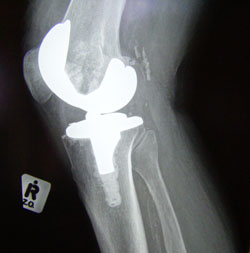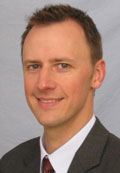Knee Specialist Doctor in Los Angeles
By Steven Meier

Knee pain is extremely common and can affect people of all ages and lifestyles. When knee pain interferes with your favorite activities, or you avoid certain activities to alleviate the pain, an evaluation with Dr. Steven Meier may be the right next step.
The causes of knee pain and injuries typically fall into one of three categories, all of which are treated at Meier Orthopedic Sports Medicine.
- Sudden injury – Fracture, strain, sprain or torn ligament (ACL), meniscus tear, knee dislocation
- Overuse injury – Bursitis, tendonitis, iliotibial band syndrome
- Chronic condition – Arthritis, osteoarthritis, chondromalacia
Board-certified orthopedic surgeon Steven W. Meier, MD is an expert in knee injuries and can provide you with an accurate diagnosis and treatment to relieve your pain. Dr. Meier is the Director of Meier Orthopedic Sports Medicine. He utilizes regenerative/restorative medicine and leading-edge techniques proven to address knee pain and repair damage with the best non-invasive methods. Combining experience with his expertise in multiple therapeutic methods, Dr. Meier can help you return to your day-to-day activities as soon as possible.
Non-Surgical Knee Treatments
Regenerative injection therapy (RIT) using orthobiologics consist of progressive techniques that jumpstart and support the body’s own natural healing processes, by improving the recovery of damaged and diseased tissues in order to decrease pain and improve function. In many cases, the use of orthobiologics can help patients effectively avoid surgery.
At Meier Orthopedic Sports Medicine, Dr. Meier and his team are experts in the following forms of regenerative medicine.
- Hyaluronic Acid Injection – Hyaluronic Acid Injection is a procedure in which a viscous, lubricating fluid is injected into the affected joint. Also, referred to as viscosupplementation, this treatment can help naturally reduce the painful inflammation associated with symptomatic chondomalacia and osteoarthritis. Hyaluronan is a naturally-occurring substance found in many tissues throughout the human body and is the key component of synovial fluid, the nutrient-rich, viscous liquid that provides lubrication to the joints and acts as a shock absorber. With a series of injections administered directly into the joint, hyaluronic acid injection therapy helps decrease inflammation and restore joint fluid.
- Prolotherapy – Proliferative therapy, or prolotherapy, is an injection treatment in which a dextrose/saline solution is used to stimulate the production of collagen, proteoglycans and other building blocks of ligaments and cartilage in damaged joints. Prolotherapy helps cushion the joints and reduce painful inflammation while also aiding the body’s natural healing process. Dr. Meier employs a unique “hybrid” technique also incorporating perineural injection therapy (PIT) which uses very tiny needles to inject dextrose around sensory nerves to reduce neurogenic inflammation.
- Platelet-Rich Plasma Therapy – Platelet-rich plasma (PRP) therapy is an injectable treatment that utilizes a concentrate of the patient’s platelets, cytokines and growth factors derived from a blood sample to stimulate the natural healing process in damaged or diseased tissues.
- Stem Cell Therapy – Stem cell therapy utilizes a patient’s own stem cells to facilitate the repair, replacement or regeneration of damaged or diseased tissue. Stem cells are an important component in recovery because they are conductors of repair and regeneration for the tissues of the body. When the body sustains an injury, adult mesenchymal stem cells (MSCs), sometimes referred to as “medicinal signaling cells,” will naturally migrate to areas of trauma and tissue damage to stimulate and direct other cells involved in the tissue repair process. Also, MSC’s reduce the painful swelling by down-regulating the inflammation cycle. At Meier Orthopedic Sports Medicine adult stem cells are harvested from the patient’s own bone marrow (bone marrow aspirate concentrate or “BMAC”) to be concentrated and then injected into the injured area.
Surgical Knee Treatments
 When surgery is recommended, minimally-invasive surgical techniques are utilized at Meier Orthopedic Sports Medicine to provide the best possible outcome for patients. Patients can expect smaller incisions, smaller scars, and quicker recoveries, thanks to medical advancements and proven technologies at Meier Orthopedic Sports Medicine.
When surgery is recommended, minimally-invasive surgical techniques are utilized at Meier Orthopedic Sports Medicine to provide the best possible outcome for patients. Patients can expect smaller incisions, smaller scars, and quicker recoveries, thanks to medical advancements and proven technologies at Meier Orthopedic Sports Medicine.
Dr. Meier and his team are experts in the following minimally-invasive surgeries:
- Arthroscopic Surgery – A minimally-invasive outpatient procedure, Arthroscopic Surgery requires only a few small incisions in order to treat a multitude of knee injuries and conditions. The benefits of arthroscopic procedures are that they are performed by making small access “portals” in the skin and using a fiber-optic viewing lens and specialized instruments to perform simple or extensive work on the inside of the joint without the need to make large incisions or cut into any muscle. Arthroscopic techniques offer patients who suffer from knee injuries, like meniscus tears or anterior cruciate ligament (ACL) reconstruction, a less-invasive option that requires less recovery time and reduced complications and pain compared to more traditional surgical treatments.
- Arthroscopic Meniscus Surgery – If non-surgical measures do not effectively resolve symptoms, Arthroscopic Meniscus Surgery can play an important role in treatment. While some meniscus tears can be repaired, there are cases that require the inner, torn part of the meniscus to be removed. The surgeon uses small scissors and a shaver placed through small arthroscopic portals to perform what is called a partial meniscectomy.The meniscus is a C-shaped piece of cartilage in the knee that cushions the thigh bone and shin bone, safely distributing body weight and reducing friction during everyday movement. When the meniscus is damaged, the first step is a physical examination and MRI imaging to evaluate the severity of the injury. For some cases, rest and physical therapy can effectively aid in the resolution of symptoms after meniscus tears. Injection therapy such as prolotherapy, PRP, and stem cell therapy can often be used to reduce or resolve painful symptoms by down-regulating inflammation caused by the tear.Steven W. Meier, MD is a board-certified orthopedic surgeon and world-renowned expert in the treatment of meniscus tears and joint preservation.
- Cartilage Restoration Surgery – Dr. Meier has a special interest in the evolving field of Cartilage Restoration. Cartilage or chondral defects are second only to meniscus tears as a culprit of mechanical knee pain. Cartilage injuries are particularly problematic since cartilage has no inherent reparative ability. New technology in cartilage restoration is changing that. While Dr. Meier has extensive experience with the established techniques of microfracture chondroplasty, osteochondral graft transfer, autologous chondrocyte implantation (ACI), and its next-generation matrix-induced autologous chondrocyte implantation (MACI), his current interests involve in the use of stem cells to facilitate cartilage regeneration.If you have a symptomatic chondral lesion in your knee in the absence of significant arthritis, you may be a candidate for cartilage restoration.
- ACL Reconstruction/Repair – The anterior cruciate ligament (ACL) is one of four major ligaments in the knee that help stabilize the joint. When the ACL is damaged, the knee becomes destabilized and may buckle or “give out.” The ACL can be reconstructed using graft tissue by way of an arthroscopically-assisted procedure. Other damage in the knee, such as cartilage and meniscus tears, is also commonly addressed at the same time. Using just two or three small incisions or “portals” and a fiber-optic viewing lens to visualize the interior of the joint, Dr. Meier is able to reconstruct the damaged ligament.Recently, there has been increasing interest in the direct repair of the damaged ACL versus the standard procedure of cutting out the damaged ligament and replacing it with graft tissue. The advantages of retaining and repairing the native ACL may include preservation of the natural nerve and blood vessel supply. This could lead to better healing, a more natural restoration of knee biomechanics, and improved proprioception or “position sense” during athletic activity.
- MPFL Reconstruction for Patellar (Kneecap) Instability – The medial patellofemoral ligament found on the inside part of the kneecap is part of the complex network of soft tissues that stabilize the knee. When a patient dislocates their patella due to trauma from athletics or an accident, this ligament can be injured, leading to recurrent patellar instability.Alternatively, other patients can experience instability and dislocations of their patella in the absence of a traumatic injury due to congenital factors involving bony anatomy or generalized soft tissue laxity.MPFL reconstruction is an advanced surgical procedure in which a new medial patellofemoral ligament is recreated to stabilize the knee and help protect the joints from additional damage. This treatment offers an excellent treatment option for people who have experienced more than one dislocation or damage and instability to the cartilage in the knee.
Knee Pain FAQ

What steps can I take today to help with knee pain?
To address an acute flare-up of knee pain, remember the “RICE” acronym when experiencing knee pain: Rest, ice, compression, and elevation. Rest gives your knee the opportunity to heal, ice and compression help reduce swelling, and elevation helps reduce excessive inflammation.
To reduce chronic or ongoing knee pain helpful measures include maintaining healthy body weight, and regular low-impact exercises such as swimming, walking, and cycling.
How can I prepare for my appointment at Meier Orthopedic Sports Medicine?
Taking a moment to reflect on your current health situation and priorities can help you and your doctor reach the best possible treatment outcome during your appointment. For example, if you are experiencing pain, think about or write down when and how your pain started. Are there certain times of day or activities which exacerbate your pain? Which activities do you avoid due to the pain, and which activities would you like to do if you did not experience pain? On the day of your appointment, wear comfortable clothes. Your doctor will likely evaluate your range of motion and ask you to perform simple movements. Bring your photo ID, insurance card, and any medical records from past surgeries or physical therapy.
I am concerned about the pain after surgery. What should I expect?
Advancements in medicine have improved prognoses and reduced post-surgery recovery times. If you are a candidate for arthroscopic surgery, for example, you can expect less pain and stiffness when compared with traditional open knee surgery. Each person’s rehabilitation course will be different and potential risks will be discussed with your doctor prior to surgery. Physical therapy and rehabilitation as prescribed by your doctor to ensure proper healing and regained mobility. Regenerative injection therapy (RIT) treatments may be an option to help you avoid surgery. Experts at Meier Orthopedic Sports Medicine will find the right treatment options for you.
Can I delay having surgery for a few months to a year?
Depending on your injury or cause of pain, delaying needed treatment can result in further joint damage and worsening symptoms. Physical examination by an orthopedic specialist ensures appropriate treatment for your specific injury and a quicker return to normal activity. When the causation of your pain is identified earlier along the course of progression, you may also have increased options for treatment. In general, if your knee pain gets worse rather than better, or you notice other symptoms in your body such as swelling, bruising, or signs of infection, an orthopedic evaluation may be needed.
